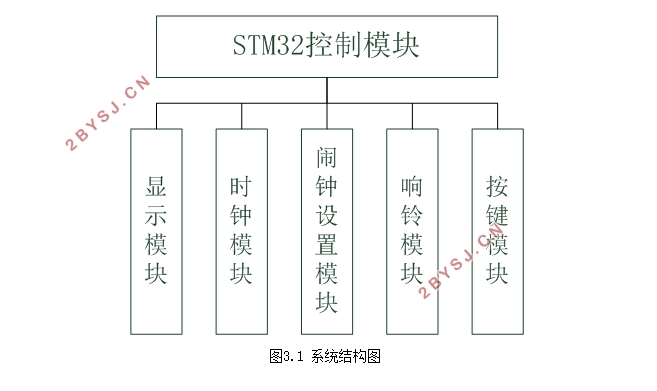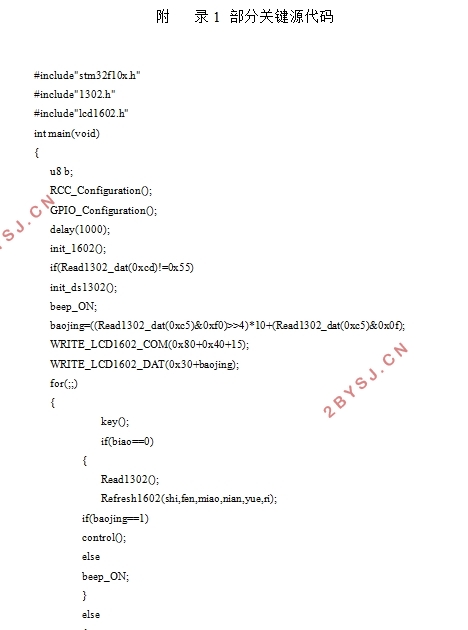基于STM32电子闹钟的设计
无需注册登录,支付后按照提示操作即可获取该资料.
基于STM32电子闹钟的设计(任务书,开题报告,论文12400字)
摘 要
闹钟是带有闹时装置的时钟,既能给人们指示时间,又能够按照人们预定的时刻发出音频信号或者其他信号。近年来,随着社会的不断进步,闹钟也是非常普遍。人们给它的定义是日常生活中不可缺少的一部分。当然对于闹钟来说,有很多实现方法。例如:石英闹钟、电子(数字)闹钟等。
本次设计的电子钟是以STM32F103微处理器为核心,结合相关的元器件(LCD1602显示器、DS1032时钟芯片、蜂鸣器等),再配以相应的软件来实现的。基于本课题的基本要求,对显示时间和报警进行了主要设计,其硬件部分难点在于元器件参数选择、电路选择;软件的难点在于模块化的程序编写。本次设计大部分功能由软件来实现,吸收了硬件软件化的思想,大部分功能通过软件来实现,使电路简单明了,系统稳定性大大提高。本系统不仅成功的实现了要求的基本功能,而且有一定的创新功能。
关键词: STM32 自动控制 定时器 闹钟
Based on the STM32 Electronic Alarm Clock
Abstract
Alarm clock is a clock with timer, can give people time to show and people can according to the predetermined time signal or other audio signal. In recent years, along with society's unceasing progress, the alarm clock is also very common. People give the definition of it is an indispensable part of daily life. Of course,there are a lot of implementation method for the alarm clock. For example: quartz alarm clock, electronic (digital) alarm clock, etc.
The design of electronic clock based on STM32F103 microprocessor as the core, the combination of related components (LCD1602 display, DS1302 clock chip, buzzer, etc.), combined with the corresponding software to achieve. Based on the basic requirement of the topic, show time and alarm for the main design, the hardware part of the difficulty lies in the choice of component parameters and circuit; The difficulty lies in the modular programming software. This design most of the function by software to realize, absorbs the ideas of hardware and software, most of the functions implemented by the software, make the circuit simple and clear, the system stability is greatly increased. This system not only successful implementation of the requirements of the basic functions, but also has the certain innovation capabilities.
Key Words : STM32; Automatic Control; Timer; Alarm clock


目 录
摘 要 I
ABSTRACT II
第一章 引 言 1
1.1设计背景 1
1.2 STM32系列微处理器 1
1.3 STM32应用开发平台 1
1.4 本次设计思路 2
1.4.1 本文主要研究问题 3
1.4.2 课题安排 3
第二章 方案选择以及元器件选择 4
2.1 实现需求 4
2.2 方案选择 4
2.3 器件选择 5
2.3.1 STM32芯片选型 5
2.3.2 显示器选择 6
2.3.3 时钟芯片选择 7
2.3.4 按键选择 8
2.4 本章小结 9
第三章 系统设计及模块化设计 10
3.1 基于STM32数字闹钟系统结构 10
3.2 基于STM32数字闹钟模块化设计 11
3.2.1 显示模块 11
3.2.2 时钟模块 12
3.2.3 响铃模块 13
3.2.4 按键模块 14
3.3 本章小结 15
第四章 基于STM32数字闹钟硬件部分 16
4.1 电路图设计 16
4.1.1 整体电路框图 16
4.1.2 STM32芯片控制电路 16
4.1.3 按键电路 17
4.1.4 DS1302时钟电路 18
4.1.5 响铃电路 18
4.2 元器件的准备 18
4.3 元器件的焊接 19
4.4 本章小结 20
第五章 基于STM32数字闹钟软件部分 21
5.1 程序设计 21
5.1.1 主体 22
5.1.2 LCD显示模块 23
5.1.3 DS1302时钟模块 24
5.1.4 按键模块 25
5.1.5 时间设定模块 26
5.1.6 闹钟实现模块 27
5.2 调试 27
5.2.1 调试主程序 28
5.2.2 调试子程序 28
5.2.3 硬件调试 28
5.3 测试结果 28
5.4 本章小结 29
结 语 30
参考文献 31
致 谢 33
附 录1 部分关键源代码 34
